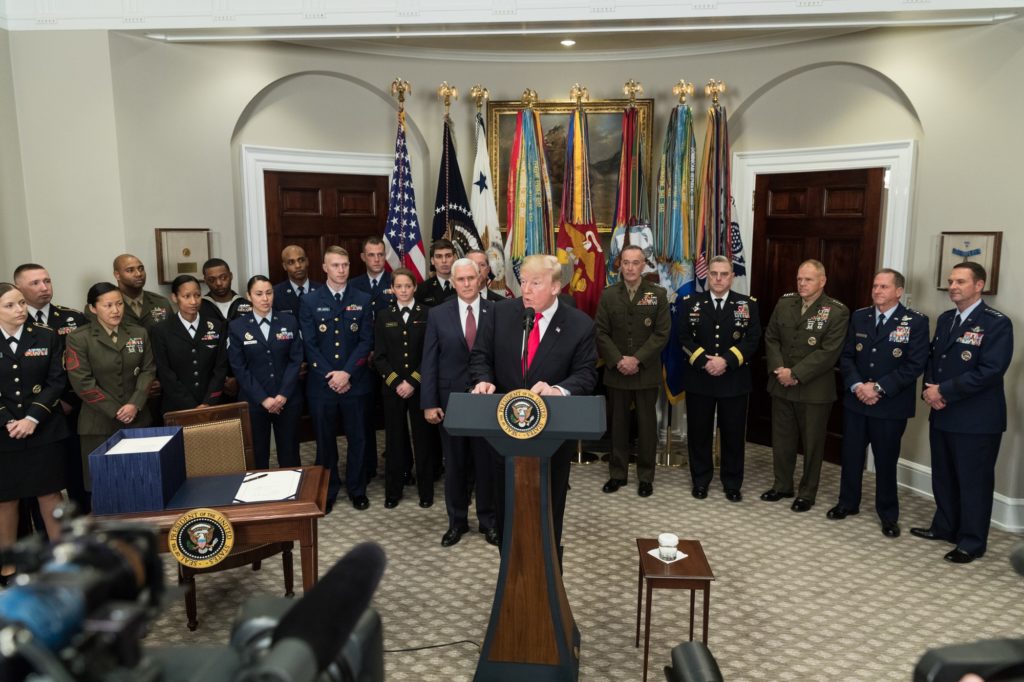The Peninsula
U.S.-ROK Cost-Sharing Deal Failed to Remove ‘Trump Risk’

By Yonho Kim
The United States and South Korea finally agreed on a preliminary cost-sharing deal on hosting U.S. Forces in South Korea (USFK), removing immediate uncertainty hovering over the alliance before the upcoming second summit between President Donald Trump and North Korea’s leader Kim Jong-un. After 10 rounds of negotiations to conclude the 10th Special Measures Agreement (SMA), Seoul and Washington settled for an increase of 8.2 percent amounting to 1.04 trillion won, or around $923 million for 2019. Although lower than the $1 billion that President Trump identified as the minimum acceptable number, the amount is more than 1 trillion won, which the Moon administration insisted was the “psychological Maginot line of its people”. However, the compromise won’t provide relief to the negotiators. With the stopgap agreement only lasting one year, instead of the usual five, the two allies must immediately return to tough renegotiations.
After the two sides failed to close a ‘huge gap’ before the previous cost-sharing agreement expired at the end of 2018, Seoul did not conceal its frustration with the U.S. negotiation tactics. Chung Eui-yong, national security adviser to President Moon Jae-in, said that it was Washington’s abrupt, unacceptable demand that stalled the negotiations at the last stage. In his op-ed in the conservative Chosun-Ilbo, U.S. Ambassador to South Korea Harry Harris urged Seoul to “do significantly more to share the burden of defending this great country.” For the sake of managing the alliance, this open negotiation is not worth repeating in the next round that will begin in the coming months. One way to prevent this from happening is for the top leaders to refrain from directly getting involved in the negotiations. Regarding the report that President Trump demanded $1.2 billion during their bilateral summit on the sidelines of G20 in last November, President Moon said “Not just President Trump but no leader of any country in the world speaks in such a manner. Such reports can be an insult to President Trump.”
It is no secret that the Trump administration seeks a drastic shift in cost-sharing with its allies. Negotiations with South Korea are partly intended to establish a precedent and guidelines for negotiations with Japan and Germany. However, that approach created the so-called ‘Trump risk’ that would not be easily removed even after the cost-sharing deal was reached. Ambassador Harris reportedly met with national security adviser Chung at the end of last year to let him know that the U.S.-ROK Mutual Defense Treaty could be implemented in a different way. This report was widely interpreted in South Korea as a warning that U.S. troops in South Korea could be at least partially withdrawn if Seoul fails to meet Washington’s demand for a substantial increase in Seoul’s contribution to the defense cost-sharing.
Conservatives criticized the Moon administration for risking the decades-long alliance by being stingy with the cost-sharing when the negotiators had narrowed down the gap to just 100 billion won, or around $89 million. In addition, there was a widespread concern in South Korea that Trump would offer a reduction of USFK in return for measures toward denuclearization at his upcoming second summit with Kim in Vietnam. Even the conservative Chosun-Ilbo argued that “the failure to agree on upkeep cost sharing only gives Trump a chance to consider a dangerous gamble.” With the growing sense of urgency, the Moon administration had little choice but to concede before the second Trump-Kim summit on both the total burden sharing cost—backtracking on the “psychological Maginot line” of 1 trillion won—and the agreement’s effective period—replacing the five-year term with a one year one.
Although the irritant is removed for now, South Koreans do not see the “troop card” as permanently off the table. South Korean experts are worried that Trump and Kim will discuss the reduction of USFK in Hanoi in response to denuclearization cards Pyongyang offers Washington. Indeed, in a recent interview, Trump complained about the cost of U.S. military presence and provided an inflated number of U.S. troops stationed in South Korea, indicating that he was open to the troop withdrawal. Modifying the U.S military presence in South Korea is not unprecedented. But this time, one hopes that the modification, if any, would be based on close consultation between the allies, not impulse.
Trump’s unwavering transactional approach to the alliance coupled with the short-term nature of the cost-sharing deal is highly likely to strain the relations between Washington and Seoul again in the coming months. Both conservatives and liberals in South Korea are worried that Trump would seek even more concessions from Seoul (including the cost of deploying U.S. strategic assets) to declare a diplomatic win ahead of the 2020 presidential election.
Since the historic first summit with Kim last June, Trump has boasted of their dramatically improved relations, even saying he fell in love with Kim. Although controversial, his remarks could be interpreted as diplomatic rhetoric with the aim of sustaining the momentum of the denuclearization talks with Pyongyang. In doing so, however, Trump should be more sensitive to the consequences of his behavior and language on a key U.S. ally. The impression of the U.S. acting like an ‘extortionist’ is the last thing the alliance needs amid joint efforts to denuclearize North Korea.
Yonho Kim is a Non-Resident Fellow at the Korea Economic Institute of America. The views expressed here are the author’s alone.
Official White House photo by Stephanie Chasez
